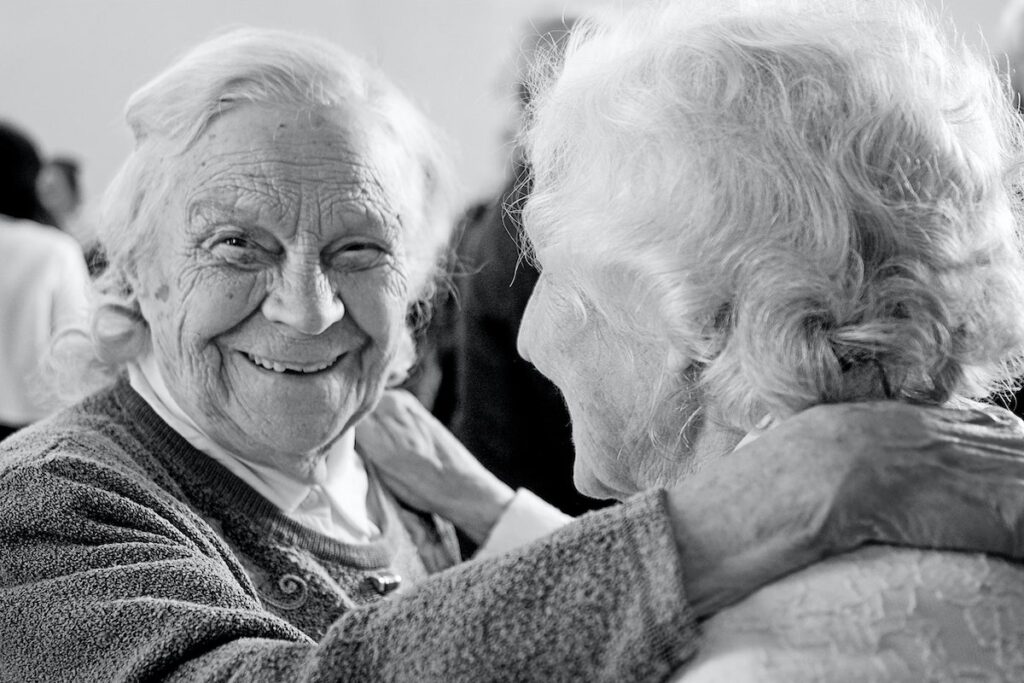
Social support services provide important post-diagnostic care for people with dementia and carers. This can include day care centres, peer support groups, and home visits from paid carers to assist with daily activities. These services provide necessary respite for unpaid carers that reduce carer burden and maintain wellbeing (Vandepitte et al., 2016). For people with dementia, accessing support services can provide important opportunities for social engagement, improve wellbeing, and enable the person to live at home for longer (Giebel, Challis, & Montaldi, 2016; Greenwood et al., 2013; Orellana et al., 2020).
However, there are inequalities in who has access to these services. For example, belonging to an ethnic minority group, being from a lower socioeconomic background, or living in a rural location presents barriers in accessing care (Cooper et al., 2016; Morgan et al., 2002; Pierse et al., 2020). People diagnosed before the age of 65 (i.e. young-onset dementia) and those with rare forms of dementia can also face challenges, because support services tend to be tailored towards older people with more common forms of dementia (Cations et al., 2017; Galvin et al., 2010).
The COVID-19 pandemic and associated public health restrictions have made it difficult for people with dementia and carers to access support services (Giebel et al., 2021b; Talbot & Briggs, 2021a). The pandemic may also further exacerbate existing inequalities in access to support services, particularly for individuals without sufficient digital literacy skills, ready access to the internet or digital technologies. Giebel et al. (2021a) sought to investigate this issue in their study, in which they explored inequalities in social support service usage before and since the COVID-19 pandemic.

Social support services provide important post-diagnostic care for people with dementia and carers, such as support groups, home visits and daily activities. Unfortunately, people from lower socio-economic backgrounds, ethnic minority groups, or in rural areas face additional barriers to access these services.
Methods
The researchers interviewed eight people with dementia and 42 unpaid carers. Participants were recruited via social care and social support services, and third sector organisations predominantly across the North West Coast of England. Interviews were conducted by telephone during April 2020, at the early stages of the first UK lockdown.
Most participants were female and living with the person with dementia. The average age of carers was 60 years old. There was a range of dementia diagnoses, including Alzheimer’s disease, Lewy body dementia, and vascular dementia. More than 10% of the sample cared for, or lived with, people with young-onset dementia. Carers lived in a mix of disadvantaged and more affluent neighbourhoods, with people with dementia tending to live in more disadvantaged backgrounds.
Results
Before COVID-19
Accessing dementia support services was often described as a challenging process, with long waiting lists and poor communication between services and service users. Participants said there was a lack of clear information to support them in identifying suitable services or locating the necessary funds to enable access. As a result, they were reliant on the unpaid carer’s own initiative, motivation, and proactivity to obtain support; something which was further exacerbated by the pandemic.
Participants frequently discussed the high costs associated with day centres, support groups activities, and care home fees as a barrier to obtaining support. There appeared to be a ‘postcode lottery’ in funded access to local services, which led to feelings of anger and frustration. Those with a medium socioeconomic status, who neither met the criteria for funded care nor felt financially able to support themselves, felt there were unfair social inequalities in accessing dementia support.
Some respondents who had access to support services felt these were unsuitable, because it did not meet their needs or appeal to their interests. This was particularly true for people with young-onset dementia. Transport was also a concern, given that services can be difficult to access without a car, public transport may not be usable for the person with dementia, and taxis can be expensive.
Since COVID-19
The COVID-19 pandemic appeared to exacerbate existing inequalities. People with dementia were not recognised as ‘vulnerable’, meaning they were not offered places on priority lists and therefore could not access additional support. This made obtaining food and medical supplies difficult for participants.
Many support services were unavailable during the pandemic. Participants felt these services provided important opportunities for socialisation, keeping fit and active, peer support, and respite, all of which vanished during the pandemic. Participants felt this lack of routine negatively impacted the health and wellbeing of people with dementia, including their cognition, motivation, and memory.
Some dementia services had adapted to COVID-19 restrictions by offering support that was facilitated by digital technologies. However, these digital forms of support were unsuitable for some and exclusive to those with internet access and an electronic device. Those who were able to access digital forms of support, often felt that these services were of lower quality and less effective than in-person contact.

Accessing the services for dementia care has always been a challenge according to participants in this study, including those with a medium socio-economic background. However, these inequalities have been exacerbated by the COVID-19 pandemic according to this new qualitative research.
Conclusions
Giebel et al. (2021) conclude that:
previous inequalities in accessing support services appear to have been exacerbated since the pandemic.
This highlights an urgent need for more targeted support to enable equitable access for people with dementia and carers from any background.

How can we ensure the provision of equitable access to post-diagnostic dementia care services in our post-COVID-19 world?
Strengths and limitations
This is the first study to explore inequalities in access to dementia care services before and since the COVID-19 pandemic. One person with dementia and three former unpaid carers formed part of the research team to ensure the study was grounded in the experiences of those affected by dementia. The voices of unpaid carers and people with dementia are amplified in this research; voices that have too often been ignored or dismissed during the pandemic.
There are some limitations to this study. Participants were mostly from a White ethnic background, therefore potential inequalities specific to ethnic minority status may not have been fully captured. For example, we know that BAME carers provide more care on average and face additional challenges (Carers UK, 2011), and many ethnic minority groups face barriers accessing mental health and dementia care services (Memon et al., 2016; Nielson et al., 2020).
The researchers also focus on the challenges of accessing remote services via digital technologies. However, research suggests that some people with dementia can and are using digital technologies to meet their needs effectively (Talbot & Briggs, 2021b). Therefore, this study may not capture some of the benefits that remote services offer for some individuals.

Lived experience was embedded in this research to ensure the findings are grounded in the experiences of those with dementia, but the sample was not culturally representative. Do additional inequalities related to ethnic minority status exist in dementia care during the pandemic?
Implications for practice
The study highlights an urgent need for more targeted support to enable equitable access to support services for people with dementia and carers from any background, which could include improved digital support for remote care. The social care sector requires more governmental support, to enable easier access for those struggling to afford basic necessities and those who are in the middle of the socio-economic ladder.
As Giebel et al. (2021) note, this study:
highlights the need for greater support into removing inequalities in dementia care, with inequalities newly emerging during the pandemic.
If you are a carer in need of help and advice, Carers UK offer information and support. Their telephone helpline is available on 0808 808 7777 from Monday-Friday 9am-6pm or you can contact them by email on advice@carersuk.org. You can visit their website at www.carersuk.org
Samaritans are open 24 hours a day, 365 days a year. You can call free anytime, from any phone on 116 123.

Giebel et al. (2021) note that this study “highlights the need for greater support into removing inequalities in dementia care, with inequalities newly emerging during the pandemic”.
Statement of interests
Dr Catherine Talbot is currently collaborating with Dr Giebel on a separate COVID research project. Catherine has worked on a similar piece of research that examines the experiences of people with mild to moderate dementia during the COVID-19 pandemic and their use of digital technologies.
Links
Primary paper
Giebel C, Hanna K, Tetlow, H. et al (2021) “A piece of paper is not the same as having someone to talk to”: accessing post-diagnostic dementia care before and since COVID-10 and associated inequalities. International Journal for Equity in Health 2021 20(76) .
Other references
Carers UK (2011) Half a Million Voices: improving support for BAME carers. Carers UK.
Cations, M., Withall, A., Horsfall, R., et al. (2017). Why aren’t people with young onset dementia and their supporters using formal services? Results from the INSP IRED study. PLoS One.
Cooper, C., Lodwick, R., Walters, K., et al. (2016). Observational cohort study: deprivation and access to anti-dementia drugs in the UK. Age & Ageing, 45(1), 48-54.
Galvin, J. E., Duda, J. E., Kaufer, D. I. Lippa, C. F., Taylor, A., Zarit, S. H. (2010). Lewy body dementia: caregiver burden and unmet needs.
Giebel et al., (2021b). Impact of COVID-19 related social support services closures on people with dementia and unpaid carers: a qualitative study. Aging & Mental Health, 25(7).
Giebel, C. M., Challis, D. J., & Montaldi, D. (2016). A revised interview for deterioration in daily living activities in dementia reveals the relationship between social activities and well-being. Dementia, 15(5), 1068-1081.
Greenwood, N., Habibi, R., Mackenzie, A., Drennan, V., & Easton, N. (2013). Peer support for carers: A qualitative investigation of the experiences of carers and peer volunteers. American Journal of Alzheimer’s Disease & Other Dementias, 28(6), 617-626.
Memon et al. (2016). Perceived barriers to accessing mental health services among black and minority ethnic (BME) communities: a qualitative study in Southeast England. BMJ Open, 6(11), e012337.
Morgan, D. G., Semchuck, K. M., Stewart, N. J., D’Arcy, C. (2002). Rural families caring for a relative with dementia: barriers to use of formal services. Social Science and Medicine, 55(7), 1129-1142.
Nielsen et al. (2020). Barriers in access to dementia care in minority ethnic groups in Denmark: a qualitative study. Aging & Mental Health, 25(8), 1424-1432.
Orellana, K., Manthorpe, J., & Tinker, A. (2020). Day centres for older people: a systematically conducted scoping review of literature about their benefits, purposes and how they are perceived. Ageing & Society, 40(1), 73-104.
Pierse, T., Keogh, F., O’shea, E., Cullinan, J. (2020). Geographic availability and accessibility of day care services for people with dementia in Ireland. BMC Health Services Research, 20, 476.
Talbot, C. V., & Briggs, P. (2021q). ‘Getting back to normality seems as big of a step as going into lockdown’: The impact of the COVID-19 pandemic on people with early to middle stage dementia. Age and Ageing, 50(3), 657-663.
Talbot, C. V., & Briggs, P. (2021b). The use of digital technologies by people with mild to moderate dementia during the COVID-19 pandemic: A positive technology perspective.
Vandepitte, S., van den Noortgate, N., Puttman, K., Verhaeghe, S., Verdonck, C., & Annemans, L. (2016). Effectiveness of respite care in supporting informal caregivers of persons with dementia: A systematic review. International Journal of Geriatric Psychiatry, 31(12), 1277-1288.
Photo credits
- Photo by Artyom Kabajev on Unsplash
- Photo by Nani Chavez on Unsplash
